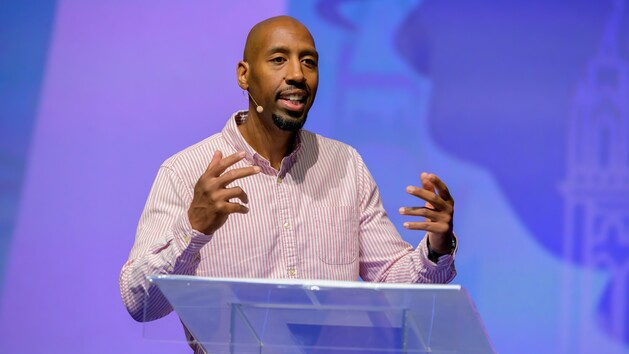30 August 2024| Belgrade, Serbia [Sam Davies with tedNEWS]
The calm and steady summer weather in Belgrade on the Friday morning of 30 August sharply contrasted Pastor Mathew Herel’s morning message at the European Pastors Conference (EPC). Herel depicted a shipwreck caused by a violent storm. In this situation, the Apostle Paul, a prisoner on board with other sailors and Roman soldiers sailing to Rome, was able to influence his custodians and those on the vessel. Remarkably, his influence was not through force or coercion but through the power of trust and respect he earned.
The fourth day of the EPC began, as on the preceding days, with an inspirational praise session that ushered in an atmosphere of expectation for Herel’s devotional message. This session, filled with uplifting music and heartfelt prayers, set the stage for Pastor Herel’s talk on the transformative power of trust and respect in community outreach. Herel is a Pastor from the South England Conference of the British Union Conference.

The conference theme, ‘Engaged in Mission,’ formed the basis of his message on the sub-theme of the day, ‘Multiply Communities.’ Herel emphasised trust as a critical element for influencing and multiplying the communities targeted for impact in the Lord’s work.
Based on the passage from Acts 27:21-32, Herel highlighted Paul’s ominous prediction to the sailors and soldiers as they embarked on their sea journey. Despite initially calm conditions, a fierce storm suddenly arose, forcing the crew to discard cargo and equipment in a desperate bid for survival. Although Paul’s warnings were initially disregarded, they eventually gained recognition due to the authority and trust he had established with the crew. It was particularly ironic that a Jewish prisoner, especially among Roman soldiers known for their strict hierarchical conduct, would earn such respect and confidence through his actions and words.
The Role of Trust and Respect in Salvation
The message underscored the profound impact of trust and respect in outreach efforts. Herel used the analogy of blood donation to vividly illustrate the concept of sacrifice in salvation. Just as blood donors selflessly give to recipients, individuals must invest time, energy, and shared experiences to earn trust. This concept was exemplified in Paul’s connection with the soldiers, demonstrating the pivotal role of trust in being heard. Herel’s message drew parallels between Paul’s strategy of earning trust through influence and the necessity of developing new trust foundations within communities.
Emphasising that people need more than just information to be saved, Herel went on to say that while God has presented the information, it is the responsibility of believers to earn the trust necessary to be listened to. According to Herel, trust is the key to being heard because it makes information effective and comes with a cost.
Jesus’ Example of Earning Trust
Herel reflected on Jesus’ example of earning trust and respect through His actions and words. The story of His encounter with the Roman Centurion in Jerusalem emphasised Jesus’ willingness to gain respect and love.
Contrasting Jesus’s actions with Paul’s, Herel noted that Jesus invested blood, sweat, and tears to win trust. His physical and emotional sacrifices—carrying His cross and praying for His enemies—were attributes of His investment of love, sweat, and tears for humanity’s salvation.
Herel concluded by challenging the church to recognise the importance of investing in building trust within communities. He stressed the collective duty to open doors for the message of salvation by fostering trust and respect. Just as Paul earned the trust of a few Roman soldiers to save the lives of many, the church must similarly invest in trust to impact the wider community.

Ideas Worth Sharing
The second part of the morning presentations focused on multiplying communities. Three presentations were given on the success stories of church planting by William Hungate from Oregon, USA, Sergio Quevedo in Tokyo, Japan, and Mikael Takamaa in Helsinki, Finland. These success stories served as beacons of hope, inspiring participants to believe in the potential of church planting.

The Four Ingredients of Church Planting
Hungate’s presentation centred on an illustration he performed using the ingredients for a mocktail drink. He named his presentation ‘Four Ingredients’ and explained how these serve as the foundation for multiplication in church planting.
The first ingredient he identified was vulnerability, which he linked to Pastor Herel’s discussion on trust. He explained that vulnerability is the first step in building trust for multiplying disciples.
The second ingredient is true discipleship, a concept he elaborated on using a quote from Ellen White. He stressed that fellowship is not the same as discipleship but that ‘by beholding, we become changed.’
The third ingredient is missional incarnational life, a term he defined as discipleship that involves going out into the community and investing in the lives of those we seek to reach for Christ.
The fourth ingredient is simplicity and time. He stressed the need to keep things simple, stating that there is no need for more programmes but simpler discipleship pathways. This approach helps to focus on genuine discipleship.
A Lesson from Tokyo
In his presentation, Sergio Quevedo focused on the challenges and successes of church planting in Tokyo. He mentioned that despite initial efforts, including training and coaching, there was no progress. However, a shift to more informal and experiential approaches and intentional prayer led to a pivotal moment when 12 young people committed to planting churches after experiencing a welcoming informal gathering. Key insights included emphasising experience over commitment, informality in spirituality, and the importance of community and prayer. This welcoming space resulted in new baptisms and community growth.
Oikos Helsinki
Takamaa’s presentation focused on the principle of Oikos, the house church, and the value of inclusivity with those whom they seek to reach. He explained that by adopting an informal house church style, an atmosphere of belonging was created, which allowed for openness to new suggestions, including a messy church, street witnessing, and a place of non-judgmental fellowship. This approach resulted in many people being baptised.
Featured Image: William Hungate explaining the ‘Four Mocktail’ experience.
Photos: [Photos: Tor Tjeransen and James Botha, Adventist Media Exchange CC BY 4.0]



